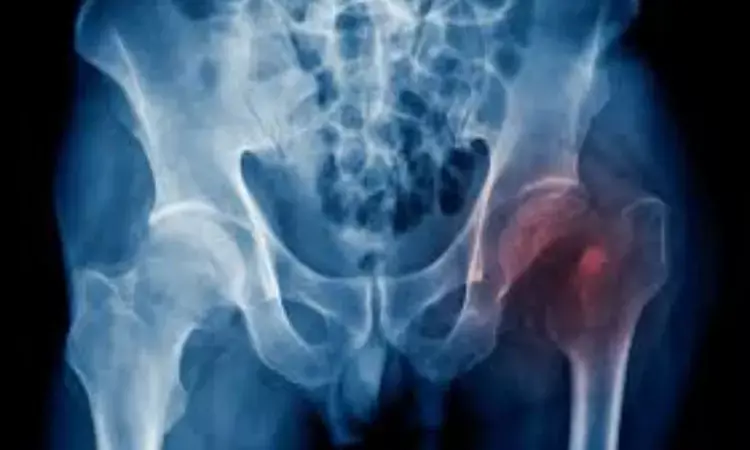- Home
- Medical news & Guidelines
- Anesthesiology
- Cardiology and CTVS
- Critical Care
- Dentistry
- Dermatology
- Diabetes and Endocrinology
- ENT
- Gastroenterology
- Medicine
- Nephrology
- Neurology
- Obstretics-Gynaecology
- Oncology
- Ophthalmology
- Orthopaedics
- Pediatrics-Neonatology
- Psychiatry
- Pulmonology
- Radiology
- Surgery
- Urology
- Laboratory Medicine
- Diet
- Nursing
- Paramedical
- Physiotherapy
- Health news
- Fact Check
- Bone Health Fact Check
- Brain Health Fact Check
- Cancer Related Fact Check
- Child Care Fact Check
- Dental and oral health fact check
- Diabetes and metabolic health fact check
- Diet and Nutrition Fact Check
- Eye and ENT Care Fact Check
- Fitness fact check
- Gut health fact check
- Heart health fact check
- Kidney health fact check
- Medical education fact check
- Men's health fact check
- Respiratory fact check
- Skin and hair care fact check
- Vaccine and Immunization fact check
- Women's health fact check
- AYUSH
- State News
- Andaman and Nicobar Islands
- Andhra Pradesh
- Arunachal Pradesh
- Assam
- Bihar
- Chandigarh
- Chattisgarh
- Dadra and Nagar Haveli
- Daman and Diu
- Delhi
- Goa
- Gujarat
- Haryana
- Himachal Pradesh
- Jammu & Kashmir
- Jharkhand
- Karnataka
- Kerala
- Ladakh
- Lakshadweep
- Madhya Pradesh
- Maharashtra
- Manipur
- Meghalaya
- Mizoram
- Nagaland
- Odisha
- Puducherry
- Punjab
- Rajasthan
- Sikkim
- Tamil Nadu
- Telangana
- Tripura
- Uttar Pradesh
- Uttrakhand
- West Bengal
- Medical Education
- Industry
High Adipokine Levels Linked to Greater Osteoporotic Fracture Risk in RA: Study

A new study published in the journal of Arthritis Care & Research showed that in individuals with rheumatoid arthritis, increased circulating adipokines independently raise the risk of osteoporotic fractures.
Adipokines, which are bioactive substances secreted by adipose tissue, are crucial for immunological control, bone metabolism, and inflammation. Chronic systemic inflammation in rheumatoid arthritis (RA) raises the risk of osteoporotic fractures and speeds up bone loss. A growing body of research indicates that changes in the amounts of adipokines such leptin, adiponectin, resistin, and visfatin may affect the activity of osteoclasts and osteoblasts, which may contribute to skeletal fragility in RA.
Understanding how adipokines interact with bone health is crucial since patients with RA already have an increased risk of fracture due to systemic inflammation, glucocorticoid usage, decreased mobility, and joint degeneration. Examining these correlations may provide information about the processes behind fracture risk and aid in the discovery of biomarkers or treatment targets to enhance bone outcomes in RA. Thus, this study was set to evaluate if circulating adipokines are linked to incidence fractures in RA patients.
The participants in a long-term RA cohort had their banked enrollment blood used to assess three adipokines: adiponectin, leptin, and fibroblast growth factor [FGF]-21. Using median values, adipokine levels were classified as either high or low. Using diagnostic codes and published methods, incident osteoporotic fractures were identified and verified by chart review.
After controlling for age, sex, race, smoking status, body mass index, prednisone usage, disease activity, calendar year, comorbidity score, osteoporosis history, and previous fracture, Cox proportional hazard models assessed adipokines and incident fracture risk.
There were 2527 volunteers in all (mean age of 72 years, 89% male). Over 27,540 person-years of follow-up, 228 incidence fractures occurred (8.3 fractures per 1000 person-years). High levels of leptin [HR: 1.47 (95% CI: 1.15, 1.90) p=0.003], FGF-21 [HR: 1.39 (95% CI: 1.16, 1.67) p<0.001], and adiponectin [HR: 1.21 (95% CI: 0.94, 1.55)], with the latter not reaching significance (p=0.13).
Individuals with increased levels of all three adipokines were twice as likely to fracture as those without raised levels [HR: 2.17 (95% CI: 1.27, 3.70) p=0.005]. Overall, independent of other known risk factors such as body mass, smoking, and prednisone usage, elevated adipokines are linked to a higher incidence of fracture in RA patients.
Source:
Baker, J. F., England, B. R., George, M. D., Brubeck, H., Sauer, B., Lenert, A., Roul, P., Thiele, G. M., Mikuls, T. R., & Wysham, K. D. (2025). Adipokines and associations with incident osteoporotic fracture in patients with rheumatoid arthritis. Arthritis Care & Research, acr.25632. https://doi.org/10.1002/acr.25632
Neuroscience Masters graduate
Jacinthlyn Sylvia, a Neuroscience Master's graduate from Chennai has worked extensively in deciphering the neurobiology of cognition and motor control in aging. She also has spread-out exposure to Neurosurgery from her Bachelor’s. She is currently involved in active Neuro-Oncology research. She is an upcoming neuroscientist with a fiery passion for writing. Her news cover at Medical Dialogues feature recent discoveries and updates from the healthcare and biomedical research fields. She can be reached at editorial@medicaldialogues.in
Dr Kamal Kant Kohli-MBBS, DTCD- a chest specialist with more than 30 years of practice and a flair for writing clinical articles, Dr Kamal Kant Kohli joined Medical Dialogues as a Chief Editor of Medical News. Besides writing articles, as an editor, he proofreads and verifies all the medical content published on Medical Dialogues including those coming from journals, studies,medical conferences,guidelines etc. Email: drkohli@medicaldialogues.in. Contact no. 011-43720751


